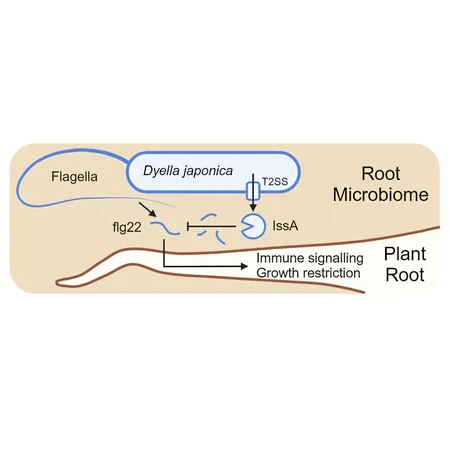
Unseen Allies: How Beneficial Bacteria Could Revolutionize Plant Health
2025-01-02
Author: Siti
In the intricate world of plants, the battle between growth and defense plays a crucial role in their overall health. While plants need to allocate energy for expansion, they must also muster resources to fend off harmful bacteria. Engineers at Princeton University are shedding light on this delicate balance, revealing that beneficial bacteria residing near plant roots might be the unlikely heroes.
A groundbreaking study recently published in Cell Reports showcases how specific soil bacteria can tip the scales in favor of growth by modulating a plant's immune responses. These clever bacteria produce an enzyme that diminishes immune activity, allowing plant roots to extend more freely, which could lead to significant advancements in agriculture.
Senior author Jonathan Conway, an assistant professor of chemical and biological engineering, emphasizes the broader implications of this research. "This inquiry addresses fundamental biological questions about the interplay between microbiomes and host immune systems," he explains. Understanding how microbes coexist with hosts, whether plants or animals, without constantly triggering immune defenses opens a new frontier in biological sciences.
The research focused on Arabidopsis, a small plant commonly used in scientific studies, which was engineered to heighten its immune response to a protein called flagellin—an essential component of flagella, which facilitate bacterial movement. When grown on plates infused with flagellin, these plants showed reduced root growth due to the energy devoted to immune activation.
The team experimented further by introducing 165 different bacterial species isolated from Arabidopsis roots to the mix. Remarkably, 41% of these isolates were found to mitigate the stunted growth caused by flagellin by suppressing the plant's immune response, allowing for longer root development.
Dyella japonica emerged as a star player in this investigation. Previous research demonstrated its immune-modulating capabilities, which were linked to a sophisticated bacterial secretion system that transports proteins into its environment, including plant cells. Delving into D. japonica's genomic secrets, the researchers identified a gene responsible for producing a secreted enzyme known as subtilase. This enzyme can effectively degrade flagellin, preventing it from triggering an immune reaction.
The team, which included a large cohort of dedicated undergraduate researchers, navigated the complexities of purifying the subtilase enzyme, a critical step to understanding its practical applications. Their efforts culminated in a fruitful partnership with chemist Todd Naumann from the USDA, who successfully isolated the enzyme from yeast cells—an innovative approach that paved the way for deeper investigations.
Now that the research team has the subtilase on hand, they are eager to explore its chemical properties to uncover its mechanisms in detail. Yet, while the findings are promising, a cautious approach is warranted. Identifying similar genes across many common soil bacteria suggests a widespread phenomenon, but the implications of this immune suppression need careful evaluation.
Is the subtilase merely counteracting plant immune defenses, or could it potentially allow pathogens to evade detection, putting plants at risk? The researchers are acutely aware of these possibilities. "We want to facilitate growth without jeopardizing the plant's ability to defend itself," cautions co-first author Samuel Eastman.
With further studies on the horizon, the ultimate goal remains clear: to harness these beneficial bacteria to enhance growth in agricultural settings while maintaining robust plant defenses. As the team works to untangle these complex relationships, one thing becomes increasingly apparent—there's a hidden world of microbial allies that could forever change the landscape of plant health.
Stay tuned for future updates on how microbial partnerships may revolutionize sustainable farming practices!


 Brasil (PT)
Brasil (PT)
 Canada (EN)
Canada (EN)
 Chile (ES)
Chile (ES)
 Česko (CS)
Česko (CS)
 대한민국 (KO)
대한민국 (KO)
 España (ES)
España (ES)
 France (FR)
France (FR)
 Hong Kong (EN)
Hong Kong (EN)
 Italia (IT)
Italia (IT)
 日本 (JA)
日本 (JA)
 Magyarország (HU)
Magyarország (HU)
 Norge (NO)
Norge (NO)
 Polska (PL)
Polska (PL)
 Schweiz (DE)
Schweiz (DE)
 Singapore (EN)
Singapore (EN)
 Sverige (SV)
Sverige (SV)
 Suomi (FI)
Suomi (FI)
 Türkiye (TR)
Türkiye (TR)
 الإمارات العربية المتحدة (AR)
الإمارات العربية المتحدة (AR)